- About
- Membership
- Resources
- Awards
- Events
- Get Involved


Wellesley High School, Wellesley Hills, MA
I have taught at Wellesley High School as a biology teacher since 2006. I graduated from Bowdoin College with a B.A. in Neuroscience, and I also hold an M.Ed. from Harvard University. My pedagogical goal has always been to close the gap between high school biology and current laboratory research. To this end, I have spent two summers doing microbiology and genetics research at Northeastern University sponsored by the NSF. I have served as the educational liaison to the Broad Institute of MIT and Harvard, helped to create their summer internship program for high school students, and have incorporated the DNA sequencing project from that program into classes at the high school. In 2013, I was one of eight Massachusetts science teachers selected to create a lesson for MIT BLOSSOMS. The video lesson on recent human evolution is accessible to teachers worldwide and was designed to incorporate features of the NGSS. Most recently, I serve on the teacher advisory board of the Personal Genetics Education Project at Harvard University.
My philosophy about teaching is to make biology experiential rather than rote. I want my students to do science, and to understand how it relates to their lives, while becoming educated citizens of the world. To teach biology in 2020 is not, for instance, memorizing the differences between oncogenes and tumor suppressor genes, instead, it is understanding how CRISPR can mutate those genes to study melanoma in zebrafish. I have also realized that these goals cannot be accomplished by myself alone, thus I have recruited a small army of science professionals to help my students become the scientists, doctors, genetic counselors of the future.
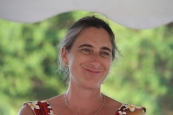
My education includes a B.S. from Cornell University, a DVM from the University of Minnesota, and a MAT from Brown University. After a short career as a veterinarian, I began teaching at Lincoln School, an all-girls Quaker school in Providence RI. My courses include 8th Grade Marine Science, 11th and 12th grade Advanced Biology, Introduction to Science Research, and Comparative Anatomy. I have also been a faculty member of the Children’s School of Science (courses include: parasitology, microbiology, geology, animal behavior, and biological illustration), the AISNE Beginner Teachers Institute, and I served as Head of Lincoln’s Science Department for six years. I am a member of the NABT, the NSTA, and the Guild of Natural Science Illustrators. I have published manuscripts with all three of the organizations, and have completed almost 30 book reviews for The American Biology Teacher. I have received national honors through the Amgen Award for Science Teaching Excellence and a Toyota Tapestry Large Grant for interdisciplinary projects uniting science and the arts.
Science is for every one of my students. Some will go on to become “real scientists” - doctors, research scientists, engineers - joining the critical struggle with our world’s challenges in health, environment, and energy needs. All of my students, however, will need good understanding of science to make thoughtful informed decisions throughout their lives. This is especially important, given the underrepresentation of women in STEM fields, in an all-girls school such as Lincoln. My students do the real work of science through hands-on activities, student-driven inquiry labs, and case studies. Content often connects science and humanities and examines the intersection of science and art. Instead of figuratively standing before my classes dispensing information, I prefer to stand behind as coach, mentor, and cheerleader as my students construct knowledge through experiment and experience.
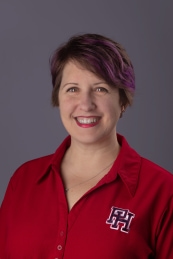
Patrick Henry High School, Ashland, VA
After working in medical offices for nine years, I returned to school to pursue a teaching license and began teaching at Patrick Henry High School in Ashland, VA in 2007. Over these twelve years, I have taught Introductory, IB, AP, and Dual Enrollment Biology, Ecology, and a leadership class for seniors. I earned a Master’s Degree in Education in 2010 from the University of Richmond and completed 18 credits of the Masters of Biology program from Clemson University in 2018. In addition to teaching, I am one of the Science NHS sponsors and I have organized the Honor Society Induction Night program since 2014. I have presented several times at the Virginia Science Teachers Conference, during my district’s Professional Development Sessions, and at the Pennsylvania Annual Teacher Workshop. This year, I am also working as one of the Nourish the Future Teacher Leaders. In my time outside of school, I enjoy hiking, reading, scrapbooking, and exploring new culinary delights.
I have been teaching biology at the secondary level for twelve years and my personal philosophy towards teaching science at the secondary level has grown over this time and is now two-fold. First, I allow students to experience science or “do science” as much as possible. Secondly, I feel strongly that high-school is a place for students to try new learning methods and techniques to see what works for them in a safe and comfortable environment. To me, being an effective teacher means meeting the students where they are and pushing them to new levels of learning.
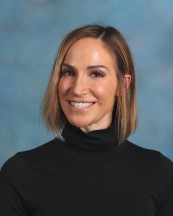
I earned a B.S in Biology (2005) and an M.A in Teaching and Leadership from Saint Xavier University (2007). I have just completed my 15th year of teaching at Homewood-Flossmoor High School, the same school at which I started my career. Throughout this 15-year span, I have taught a variety of science courses including biology, chemistry, physics, and forensic science. I am passionate about curriculum design and played an integral role in aligning our biology curriculum, instruction, and assessments to NGSS. In addition to teaching science, I also serve as a sponsor for our Zoology & Botany Club.
As a freshmen biology teacher, I play the vital role of instilling a passion for science in students that are just beginning their high school journey. My goal is to pique their interest in science through engaging investigations and real world applications so that they will become responsible, knowledgeable, contributing members of the school community, the Homewood and Flossmoor communities, and, ultimately, the scientific community.
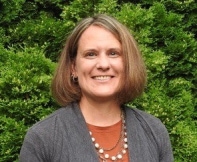
After graduation from Caston High School, I earned a Bachelor of Science degree in Secondary Education in Biology & Chemistry at Manchester College, (now Manchester University). I began my career at Maconaquah High School in 1999 teaching Chemistry, Integrated Chemistry/Physics, and Biology. After getting married in 2002, I taught eighth grade science at Summit Middle School one year before finding my “forever” school at Southwood High School where I currently teach AP Biology, Biology I, and Anatomy/Physiology. I just completed my 21st year of teaching. I earned my Masters in Secondary Education degree in 2009 from Indiana-Purdue University, Fort Wayne and am currently taking classes through Indiana Wesleyan to earn 18 graduate level biology classes that will allow me to teach dual credit courses at the high school level.
When I am not teaching, I am an assistant wrestling coach for the Jr./Sr. High School wrestling team and I officiate cross country and track. Outside the academic arena I am active in our church, enjoy scrapbooking, reading, running, and being a mom. I live in North Manchester with my husband, Cory and two children Cale and Ivy.
After earning a bachelor's degree from Hope College in 2005, I began my teaching career at Lansing Catholic High School. During that time I also earned a master's degree in biological sciences from Michigan State University. In 2013, I stepped away from the classroom to pursue doctoral studies at MSU. I worked on the Carbon TIME Project developing an NGSS-aligned biology curriculum and professional development for teachers. I also taught courses for preservice science teachers and served as a field instructor. In 2017 I earned a dual PhD in Curriculum, Instruction and Teacher Education and in Ecology, Evolutionary Biology, and Behavior. I currently teach at the East Kentwood Freshman Campus. I am an active member of NABT by presenting at the conference, publishing articles in The American Biology Teacher, and serving as a reviewer for the journal. I was a participant in the first cohort of the NABT/BSCS AP Biology Leadership Academy, and went on to help lead Teacher Academies in Michigan, New York, and Colorado.
My goal as a science teacher is to spark students' curiosity about the natural world and develop their understanding of how scientific knowledge is generated and used. My dissertation research explored how teachers can engage students' curiosity to foster three-dimensional science learning as envisioned by the NGSS. Doctoral studies also heightened my awareness of issues of equity in education. I am a member of my school's PBIS committee working to ensure equitable outcomes for all students. In addition to teaching, I am passionate about supporting other science teachers. I have presented more than 50 times at state and national conferences, worked as an independent consultant providing professional development, served as an item writer for our state science assessment, and created online learning modules around the NGSS. As a member of the board of directors of our local affiliate of NABT, I help to lead a professional learning community of biology teachers in our state.
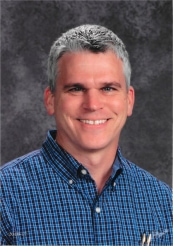
I have been teaching all levels of biology for thirty years. Upon graduating from Bowling Green State University, I started my teaching career at St. Joseph Central Catholic High School in Fremont, Ohio and have been at Otsego High School in Tontogany, Ohio for the last 24 years. During this time I have been involved in writing new science standards for the Northwest Ohio Catholic Dioceses as well as writing the new Human Anatomy and Physiology standards for the state of Ohio. To go along with the standards, I wrote digital curriculum for NWOi3 and Teacher Trailblazer programs, each funded by an Ohio Straight A grant. Aside from teaching, I enjoy attending and leading professional development sessions. In fact, my first presentation was at NABT in 1991. Since then I have helped organize local and state conferences, presented at local and state conference as well as attending many conferences. I am married with three children, with the youngest starting college this year majoring in education!
I have three goals for my students that comprise my philosophy of education. When a student leaves my class, I would like them to be scientifically literate citizens, discover a passion for biology, and inform them about the many careers that are available to them in biology. With those goals in mind, I try to provide opportunities, both inside and outside of class, to help students develop a passion for biology.
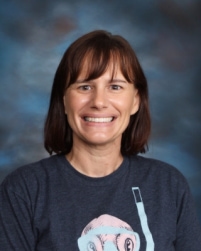
This is my 23rd year as an educator at Germantown High School, a public school in the Milwaukee area. I teach Honors Biology and PLTW-Environmental Sustainability. I am a proud alumnus of the University of Iowa. I enjoy sharing what I have learned throughout my career with other educators. I have presented at state and national science & engineering conferences. I served as the Local Arrangements Coordinator and Diversity Strand Leader for the 2017 NSTA Milwaukee Regional. I was also a co-chair of the WSST annual conference in 2017. I recently held the position of interim COO for WSST and is currently WSST’s Membership and Public Relations Director. I also work with pre-service teachers at UW-Milwaukee, and serve as a mentor to teachers in my building. I work as a color analyst for high school and college sports on the internet and TV. I enjoy kayaking, biking, fishing and playing board games with my husband of 22 year and our two teenage sons.
The most important responsibility I have as an educator is to create and foster a safe learning environment for my students. It is imperative that they are able to communicate their thoughts, question others, take risks, and express their creativity without feeling judged or embarrassed. My students have the freedom to develop and enhance their collaboration, communication, critical thinking, creative thinking and problem-solving skills. I design engaging lessons rooted in authentic scientific practices that challenge students to think deeper and broaden their knowledge of science. These opportunities will help students form connections between the classroom and the world around them and assist them in becoming scientifically literate citizens.
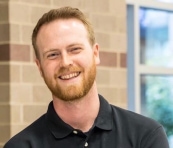
I graduated from the University of Kansas in 2011 with a degree in Ecology and Evolutionary Biology. I simultaneously completed the UKanTeach program to earn my teacher’s license. In the spring of 2020, I graduated from Clemson University with a Masters Degree in Biological Sciences. From 2011-2016 I taught freshmen biology at Seaman High School in Topeka, KS. While at Seaman I also coached tennis and swimming. Since the fall of 2016 I have taught honors biology in the Engineering Academy at Olathe Northwest High School. At ONW, I am the head coach of FIRST Robotics Team 1710. Within the Olathe School district, I serve on the Literacy Leadership team. I am also currently serving as the Vice President for the Kansas Association of Biology Teachers.
Effective teaching provides students with experiences steeped in authentic phenomena and engaging problems. Students ask questions, investigate, and make evidence-based arguments as they seek to understand the natural world. To be an effective teacher in the Engineering Academy at Olathe Northwest High School, I approach the curriculum from an engineering perspective. As such, students define engineering problems based on authentic situations connected to biology. These problems are the vehicle for students to investigate phenomena and understand biological concepts needed for effective solutions. Effective teaching also requires a willingness to continuously grow and develop through effective collaboration and leadership. Collaboration broadens perspectives, provides a safe place to question assumptions, and allows for the spread of educational philosophies and strategies to new regions. As I look to the future I hope to collaborate with teachers from a variety of settings to build and implement an inclusive biology curriculum that empowers students to be agents of change.
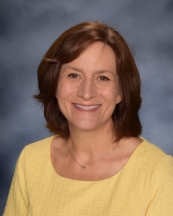
I currently teach AP Biology, Anatomy and Physiology, and Genetics at Visitation Academy Saint Louis. I have a BA in Biology and M.Ed. in Science Education from the University of Missouri and a MA in Biology from Washington University Saint Louis. I was a member of the 3rd cohort of the Advanced Placement Leadership Academy, serve as an AP Biology Reader, and am a member of NABT, NSTA, and STOM. I have served as a David L. and Marilyn M. Kirk Evolution Teacher Fellow at WUSTL, have been awarded the Carol B. and Jerome T. Loeb Prize for Excellence in Teaching Science and Mathematics from the Saint Louis Science Center, and have been named the Midwest Spotlight Educator by METC.
In the past 16 years, I have had the opportunity to teach many classes at Visitation Academy ranging from six grade science to AP Biology. It is my goal in these classes for students to deepen their sense of awe for the intricacies and diversity of life while they develop science skills by doing science. I work to create a supportive environment where students can challenge themselves academically while having fun. My students get to engage in science through investigations, engineering projects, building models, scientific argument, and citizen science projects. My students benefit from what I have learned from the amazing teachers I have met through NABT, BSCS, NSTA, and the Washington University Saint Louis Institute for School Partnership. I am especially grateful for the evolution book club started by David Kirk at WUSTL and for all of the teachers that I have met during these meetings.
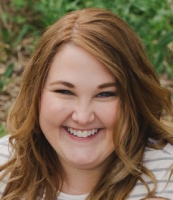
I am currently in my 13th year teaching science at Brandon Valley High School in Brandon, SD. I have always taught Human Anatomy & Physiology and currently also teach PLTW - Human Body Systems. In the past, I have taught Biology 1, Biology 2, and a fundamentals of Biology class. In addition to my teaching duties, I coordinate blood drives at the school 3 times per year, regularly participate in and present at professional development opportunities, and volunteer at my local church. I helped start our first ever HOSA (Health Occupations Student Organization) chapter here at BV and was awarded the 2018 Outstanding HOSA advisor. I am still serving as the sole advisor for this group. In the past, I have also served as a coach for our science bowl team, science Olympiad team, and as an advisor for National Honor Society. I am married to a wonderfully supportive man named, Jason, and together we have two beautiful sons named Jackson and Luca.
My philosophy as it relates to biological science education is to simply help my students understand that the world is larger than we often imagine it. I want them to understand and learn about all sizes of living organisms and how each of those plays a role in our lives on this Earth. It’s important for them to understand that they’re made of cells, but also that each cell has an individual job to do in order to make our bodies run smoothly. Then to understand that each organism has a unique niche that plays an individual role in an ecosystem. After taking a Biology course, students should have a better understanding of how living things impact each other and their environment, which ultimately may help them have a better understanding of their own personal niche in life. Knowing about themselves and the world around them will help them to become better, more educated human beings as they leave high school and head out into the real world.
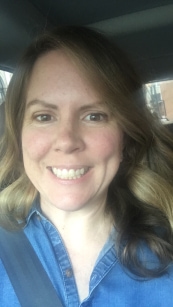
I have been teaching in the high school Biology for twenty years. My favorite subjects to teach are Biology, AP Biology, and Zoology. I obtained a degree in Biology from Meredith College. I was nominated for the NC OBTA in 2014. I will tour Yellowstone Park with a an Educators in Excellence Award from the NC Museum of Natural Sciences grant in the summer of 2021. Biology is my passion. I want to instill a love of learning into my students. I believe in using models, hands on labs, and a good old fashioned lecture is a favorite of my students.
Learning should involve thinking and working. Teach students to remain consistently curious about their natural world.
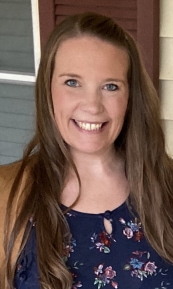
I have been teaching at Siegel High School in Rutherford County for 13 years. I moved to Murfreesboro in 1998 to attend Middle Tennessee State University where I graduated with both my BS and MS in Biology. It was during my time as a graduate teaching assistant that I discovered my passion for teaching. I began teaching high school in the fall of 2007 because Mr. Ken Nolan at Siegel decided to take a chance on a young biologist who wanted to teach full time. During my time in education, I have taught various levels of Biology, Ecology, and Environmental Science. I prefer using a hands-on approach to teaching in the classroom. I encourage students to work together through discussions, data review, and experimental designs to learn about biology and the environment around them. In addition to teaching in the classroom, I promote environmental awareness by sponsoring Siegel's Green Club, an environmental service based organization. Students participate in weekly recycling at the school and Murfreesboro Greenway cleanups as well as kayaking, camping, and other outdoor experiences. I am so thankful for all the students I have had the pleasure of teaching during their high school careers because they still teach me so much everyday. I am also eternally grateful to the other educators who have influenced and helped me become a better teacher during my career.
I think it is really important in today's society that every citizen have some understanding of Biology and the scientific process in general. I always tell my students you don't have to love Biology but I hope you gain an appreciation for it and how it shapes your world.
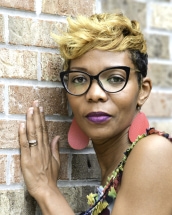
My teaching career started after I graduated from the University of West Alabama in 2001 with a bachelor's in Biology. I taught my alma mater, Choctaw County High School, for seven years. I then moved to Tuscaloosa, Alabama, and taught at Northridge High School for four years. My current teaching position is at Thompson High School in Alabaster, Alabama. I have been in this position for eight years. While teaching, I earned my master's degree in 2004 and my educational specialist degree in 2015. I am currently a doctoral student at the University of West Alabama. I have a wonderful husband, Crendal, and two beautiful children Kindall, 19, and Aiden, 11.
I had no classroom experience at the beginning of my teaching career, but I was determined to attend professional development to learn more about teaching. I had to find ways to connect and engage my rural students, who lacked many resources. Now after over 19 years in education, I am still motivated to learn current and effective teaching strategies to give my students the best learning experience possible. I try to create a classroom climate that welcomes discussions, student advocacy, and student-centered activities. My strength in the classroom is my ability to form strong student-teacher relationships with my students. This relationship permits my students to be active participants in their learning process. I absolutely love being a biology teacher; I couldn't imagine having another career. I hold myself to very high standards regarding being a black, female, science educator in the South. It is of the utmost importance to me to fulfill my calling to be a great teacher. I am so honored to be the recipient of this prestigious award.
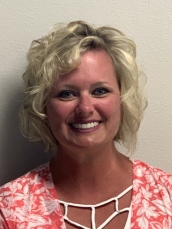
My name is Annette Buckner. I have currently been teaching for 15 years. I taught for 11 years in Alabama then I met my husband and moved to Dalton, GA where I have been teaching at Dalton High School for 4 years. I currently teach Biology, Forensics, and Botany. I enjoy teaching Biology because I get to teach students about life and that in itself offers authentic learning experiences that students can relate to. I am also currently pursuing my Ed.S in Instructional technology which has enabled me to bring new learning experiences by using technology into my biology classroom. My hope is that every student leaving my classroom knows that I care about them and knows that science can be fun.
As a teacher I have found that students need to know you care about them. The first few days of school are pertinent to establish a good relationship with students so they know you care about them. I also feel that with enough time and patience any student can learn anything. When I was in school I had a difficult time learning content, however, with enough time and patience from teachers I could eventually learn the content and do well at whatever the content was. I have also seen with students that biology can be confusing for them. However, if I can help students have authentic learning experiences they understand that biology can be fun and they can learn anything.
After receiving a Masters degree in Biology Education from Virginia Commonwealth University in 2004, I embarked on an education career, spending the next eleven years at high schools in Maryland and Pennsylvania where I taught microbiology to upperclassmen and biology to underclassmen. During the last five years, I have taught Honors Biology and Anatomy & Physiology at Shadow Ridge High School in Surprise, AZ, as well as establish the leading AP Biology program in Dysart Unified School District. I have also co-developed a state-aligned biology curriculum and led the Professional Learning Community of biology teachers for my school. Throughout my seventeen years of teaching, I have partnered with local scientists and universities to provide students with practical lab experience.
My personal practice and philosophy of teaching centers around a multi-tiered path to maximizing student growth. First, I seek to build a rapport with students in order to instill motivation and a love for the unique learning experience my classroom offers. Second, I continuously fine-tune specific pedagogical techniques which - while individually small when considered separately - are collectively enormous in terms of their synergistic impact on learning. Third, I help my students focus on the real-world relevance of what they investigate in my lab. Using this three-pronged approach, I can achieve my aim of equipping young people with critical thinking and interpersonal skills - as well as a solid grasp of the scientific method - so that they can become problem solvers that change the world.
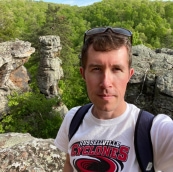
My name is Chance Duncan and I’m a native of the Arkansas River Valley area in Central Arkansas. I grew up here, spent a lot of time in the woods and fields around my house, and graduated from a fairly small town called Dardanelle. Following graduation, I attended Arkansas Tech University, where I majored in Life and Earth Science Education. I graduated from ATU in 2007 and began teaching at a succession of schools in the River Valley, beginning at a very small district in Magazine, AR where I was one half of the entire secondary science department, and I’m now at the largest district in my local area in Russellville, AR. After teaching for a couple of years, I started a master’s degree program from Montana State University called the Master’s of Science in Science Education. The program took three years to complete and I really enjoyed it. Bonus, it gave me an excuse to travel to gorgeous Bozeman, MT and spend a few weeks there in the summer. I finished in 2014, and that degree allowed me to begin teaching concurrent credit courses. I am now teaching concurrent and non-concurrent Pre-AP Biology, and a Project Lead the Way course called Medical Interventions at Russellville High School, and this is where I envision I will finish out my career.
We have all heard and probably preached the idea that “science isn’t a list of facts to memorize, but a process of discovery.” As cliche as this has become, I feel that this approach is what underlies everything about my pedagogy. Science evolved out of the innate desire of the human species to know what and why things happen. Young children take this impulse and run with it, seeking to understand as much as they can as quickly as they can. Unfortunately, by the time they reach high school, a combination of physiological changes to the brain during puberty, and, all too often, the mental abuse of rote memorization and regurgitation in previous classes beats the curiosity and eagerness to learn right out of them. I incorporate as much student-driven inquiry and experimental design as possible and give them time to explore their curiosities to try to rekindle that desire to want to know. I believe this is the best way to engage students in the process of science and pays tribute to what we, as a species, have been able to accomplish through it.
I earned my Bachelors of Science in Zoology from Oklahoma State University in 2006. I began my teaching career at Putnam City High School in Oklahoma City in 2008. After a decade of teaching life sciences and coaching soccer at PCHS, I accepted a position in career tech education at Metro Technology Centers in Oklahoma City. I spent my first year there teaching all science courses in the alternative education program at Metro Tech, Metro Career Academy. I was then transferred to Metro Tech’s Biomedical Sciences Academy where I currently teach A&P, PLTW’s Human Body Systems, and STEM Core. In 2015, I curated and edited the district biology textbook for Putnam City Schools. In 2018, I was featured in an international expose’ regarding teaching in Oklahoma by the BBC.
The foundation of my teaching philosophy is to truly care about my students as people first and to teach them second. In order for true learning to be possible, valuable relationships must be built with students. My classroom has a culture of positivity and fun. It is imperative to me that my students feel valued and loved. Once that culture is established and cultivated, my students are able to truly focus on their learning and curiosity in a safe environment. I am honored to inspire a sense of wonder in my students that is directly applicable to issues in their communities and families. My goal is to awaken students to the idea that science is not simply memorization of certain processes, but is, in fact, an integral aspect of their daily lives. If I am able to get a student to contemplate a natural phenomenon, conduct research, and give an explanation, I feel I have been successful.
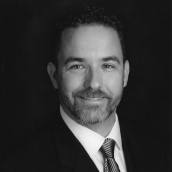
Growing up in a family of educators, with easy access to countless acres of woods during the summer months, an interest in teaching life sciences has always seemed a natural fit for me. Taking a break between high school and college to explore the Atlantic Ocean and marine biology aboard the SSV Corwith Cramer out of Woods Hole, MA, cemented my love of life and the environment. My passions for education and life science were then honed during my undergraduate experience at Juniata College, in Huntingdon, PA. Since 1999, I've enjoyed working with young scientists at Greenhill School, in Addison, Texas. While the courses I've taught run the gamut of life sciences, my main focus through the years has been on AP Biology and Advanced Biology courses. Outside of the classroom, I've been the Assistant Chief Reader for the AP Biology reading for the past three years, while serving in the capacity of Question Leader, Table Leader, and Reader before that.
My educational and professional goals include creating a safe environment where students continually challenge themselves by asking “What do we know?” and “How do we know it?” In my classroom, students lean into ignorance by asking questions regarding the world around them, and then answer those questions via careful observation and evidence-based reasoning. Said another way, I challenge students to become better scientists. How I developed these goals started with the clichéd question, “What do you want to be when you grow up?” At five years old, my emphatic response was a marine biologist, largely stemming from a Fisher-Price playset featuring dolphins. My dreams of marine biology were short-lived though, because by six years old I became serious about my career and decided upon teaching. And while my career path was always set, the journey was not always straightforward. It’s featured twists and turns along the way; variously stagnating in large public high school classes, sailing the Atlantic Ocean aboard a tall sailing ship, and realizing the fit between my rational, evidence-driven mindset and a fascination with living systems. Being keenly interested in education, I grew disillusioned with my experiences in high school. My large public high school did not provide the challenges I needed to thrive. A system focused on seat-time and memorization rather than questioning and understanding frustrated me. Yearning for a more meaningful education, I left high school early and traveled to Woods Hole, Massachusetts. There I participated in the Sea Education Association’s SEA Semester aboard a tall sailing ship, the SSV Corwith Cramer. Finally flourishing, I explored aspects of the environment I was previously unaware of while simultaneously making tangible progress towards my life goals. Energized and excited, I re-entered formal education at a small, liberal arts college in Pennsylvania. There I selected courses, activities, and athletics with an eye towards becoming a teacher. Teachers are called upon to coach? I ran cross-country and played lacrosse. Empowering student voices is important? I became involved in Student Government. Considering a career at boarding schools? I pursued a position in Residential Life. After college, I explored employment in independent schools for the opportunity to influence curriculum design and challenge young scientists through experimentation and research. Caring more about the school than my location, I cast a wide net, ultimately landing in Dallas, Texas. Here I’ve found all the things I crave professionally; talented students, supportive administrators, and colleagues that welcome collaboration. In this environment, I’ve helped students of all ability levels discover a passion for the natural world, realize the value of experimental data, and develop the skills necessary to become contributing members of a scientifically literate society. In my classroom, I strive to create an environment where my students feel safe asking questions; a place where uncertainty, followed by observation and analysis, is always welcome. Whether during class discussion, small group work, or in the lab, I gladly entertain students’ knowledge-based questions. Still, I get more excited when students ask novel questions, as these moments push my own understanding. Even better are the questions for which there is no current answer. When faced with these open questions, I ask students how we would develop a hypothesis and test the premise, followed by offering them the chance to work in the lab and derive new knowledge. For me, whether or not we experimentally pursue the question has less importance than the continual reminder that science allows all of us to understand the world around us.
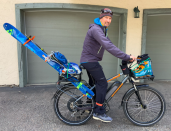
I never thought my ski bum dream would launch my 30 year teaching career at Vail Mountain School in Vail, Colorado. My job is amazing and I just can’t think of a better way to spend my days than teaching high school biology. I get to take part in the daily excitement of learning about life at so many levels. Also, the accessibility of biotechnology equipment during the last decade has challenged me to integrate tools like PCR into my teaching, inspiring me to learn again alongside my students. After work, I am lucky to play in the beautiful Rocky Mountains. Over the years, I have been able to share my passion for mountain biking, hiking, and skiing with students through countless school adventures. This has been a very rewarding career and I am happy to get to share my joy for the profession with so many outstanding biology teachers through my connections with NABT and the AP community.
Meaningful learning requires genuine engagement. I feel that it is the job of the science teacher to create a setting in which students feel motivated and safe to fully immerse themselves in their education. I believe that motivation should be cultivated in a genuine way by having students observe and explore interesting phenomena. Through direct (with hands whenever possible) examination of life processes in our amazing world, students become inherently curious and ask thoughtful, genuine questions that they will be excited to explore. I have made the integration of phenomenon-based lessons a high priority in my science department for the past few years and according to recent course feedback, it has been effective in increasing student’s interest in continuing to study science in the future. As a department, we have created an environment in our classes where students are willing to try, to fail, to learn, to laugh at mistakes and to take full advantage of the opportunities we are providing them. Now, more than ever, there is a need to improve science literacy in our nation. Students are seeing the consequences of science ignorance as we battle the serious issues of public health and climate change. By establishing a foundational understanding of fundamental biological and ecological systems, students can engage thoughtfully in local health and climate initiatives as informed citizens, and can even feel empowered to act independently. One example of how I have scaffolded this type of engagement is by taking a small group of students to the Sea of Cortez with EPI (Ecology Project International). Through NGSS inspired lessons, students apply science practices to small ecological challenges and then contribute to data collection in several citizen science projects (including population surveys of marine invertebrates, survey of an invasive sea star species, and microplastic surveying). Students come away from this experience with knowledge, skills and passion to initiate local projects, which they have successfully done each year. Still, I feel that it is most important to focus on engaging in the classroom by fostering the feeling in students that they have a strong voice. By creating challenges in the class and during labs, I am able to offer numerous opportunities for mini-success stories which are designed to build confidence in the risk-taking that is inherent when trying something new. My hope is that classroom success will lead to community, and even broader science-motivated initiatives in the future.
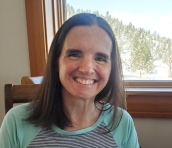
Capital High School, Helena, MT
Sarah Urban is an honors and AP Biology Teacher at Capital High School in Helena, Montana. For the past 19 years she has taught all levels of biology to middle and high school students. Her education includes a BS in Cell Biology from Western Washington University, a Master in Teaching degree from Whitworth College, and a CEHS (Certificate in Environmental Health Sciences) from the University of Montana. Sarah loves participating in programs that connect students to scientists who promote and provide authentic research experiences for students. These include bacteriophage research (PHAGES through Montana Tech) and research on cardiovascular health (REACH through the University of Montana). She is also the advisor of the school's student run science camps for kids, green club advisor, science club coadvisor, and assistant cross country coach. Sarah loves all things science, chasing her three children, and running in the mountains!
The excitement of continual discovery and the love for learning the complexity of life are passions I share with my students daily. I view the role of a teacher as an academic “coach” who teaches, inspires, guides, and supports my students in authentic learning experiences that drive their own passions in biology and other disciplines. I strive to provide students with a foundation and appreciation for biological science but also the ability to apply learning to new situations, create a love for learning, and challenge them to constantly better themselves as people and positively impact their community. The challenges we face in 2020 remind us that teaching is a craft that is never perfected. The impact biology teachers have on each student and the community has never been more important than it is today!
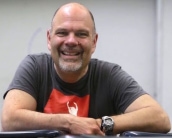
Teaching biology is my art, my craft, and my intellectual love – but that wasn’t always the case. My undergraduate major was sociology, which inspired a commitment to equity and social justice that continues to inform my efforts as an educator. A few years after graduation, I read The Selfish Gene by Richard Dawkins, which kindled my love for biology, and influenced me to decide that a life spent teaching about what Darwin called the “endless forms most beautiful and wonderful” would be a life well spent. I began my career working in an alternative school in Roseburg, Oregon. That’s where I first brought music into my biology classroom: it’s when I wrote the Cell Song. It’s also where I first experimented with computer assisted instruction. Music and computer-assisted instruction have continued to be major currents in my career, leading ultimately to my SCIENCEMUSICVIDEOS YouTube channel, and to my online AP Biology Curriculum at sciencemusicvideos.com. Since 1992, most of my career has been spent at Berkeley High School. I’m indebted to my community, my colleagues and my District for their ongoing support.
Biology is a tough subject to teach, with complex ideas and sometimes overwhelming amounts of detail. But those same traits make it an easy subject to love. My goal as a teacher is to have my students learn a ton of biology…and also learn to love it. Here’s how. First, I make the learning interactive. I do a lot of direct instruction, but I always provide my students with lots of opportunities for talking and writing about what they’re learning. What I want is for them to feel the joy that comes from being able to explain a signal transduction pathway, or the flow of electrons in photosynthesis. Secondly, I get my students to sing. For as long as I’ve been a classroom teacher, I’ve been bringing my guitar into class, and teaching my students songs about cell division, membranes, food chains, DNA, cloning, and so on. Music and rhyme, along with all the positive emotions elicited by singing in a group, help encode content into long term memory. And singing allows me to communicate a powerful message: “I love biology so much that I sing about it. And you can, too.” Third, I try to deepen my students understanding — and love for biology — through computer assisted instruction. When students complete the interactive tutorials on my sciencemusicvideos website, they feel the joy that comes from being able to master something that’s complex. And they can express that joy (and understanding) in speech or writing. It shows up when we have class discussion, and when we’re working in the laboratory. Loving biology and learning biology. It’s been what my career has been about, and that’s also the experience I’ve tried to bring to every student. After nearly 30 years, I can’t think of anything more fun to do.

The National Association of Biology Teachers empowers educators to provide the best possible biology and life science education for all students.
NABT, P.O. Box 335, Heber City, UT 84032
office@nabt.org | Fax: (202) 962-3939
(888) 501-NABT or (703) 264-9696
Thank you for visiting the NABT website.
Our privacy policy is found here.
Announcements for products or services on this website do not imply endorsement of or by NABT.
Website by Morweb.org
Copyright National Association of Biology Teachers
